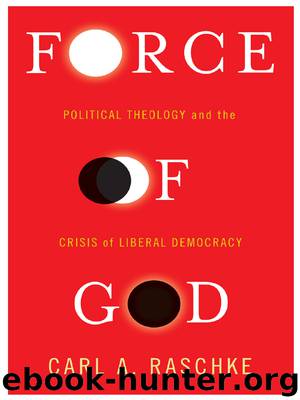Force of God : Political Theology and the Crisis of Liberal Democracy by Raschke Carl A

Author:Raschke, Carl A.
Language: eng
Format: epub
Tags: REL051000, Religion/Philosophy, PHI019000, Philosophy/Political
Publisher: Columbia University Press
Published: 2015-08-10T16:00:00+00:00
COUNTERFEIT MONEY
Derrida has also raised the question of the same aporia in reference to the religious, a question he derives from Levinas’s paradoxical formulation of the “infinite” responsibility a finite being has toward the Other. The secret of this responsibility is the key to paradox itself in the act of faith, which Kierkegaard’s elaboration of the story of Abraham and Isaac at Mount Moriah so emphatically illustrates.16 Transposed into the context of Given Time, the Derridean paradox of fiduciary responsibility implicates as well the universal problem of a real economy that can only function as if it were, in a genuine sense, a system of acts of charity. The tokens of exchange inevitably must be perceived as “filthy lucre,” although lucre is the key to life itself, unless one “titles” (Derrida’s word) something different—as gift. We are strongly reminded of Max Weber’s insight that capital as the promise of further gifts of “investment,” giving life to the exchange apparatus, ultimately derives from an unwitting accumulation of nonconsumables that is a byproduct of the Protestant sense of fiduciary responsibility to God and his universal kingdom.
Marx naturally understood, without the benefit of having read Weber, that the calculus of the accumulation of nonconsumables had its obverse as well as perverse side—the expropriation of the value of the labor and of the laborer. But even the “capitalist” ideology in this sense cannot be separated from a certain axiology or theory of value. In Weber’s model of the Protestant ethic, the labor value produced by the worker, which in turn is appropriated by the capitalist as capital, signifies a certain fiduciary “sacrifice”—i.e., a transmutation—of the real for the sake of God’s eschatological purpose, the Christian form of the transvaluation of all values. “Perversely” speaking, we can say the “immiserated” laborer performs an act of “charity” in Derrida’s sense. Capital is as much counterfeit money as anything that otherwise draws its value from the ruse of a “greater good,” even if it be a strictly imaginary anticipation.
Marx’s well-known denunciation of this sort of “mystification” naturally stemmed from a moral outrage that could not abide the subterfuge of systemic exploitation under any “providential” titling of God and the greater good. Adam Smith’s “invisible hand” is a case in point. But we now know that even hard-nosed “materialist” allegiances, like those of Marxists, smack of the same metaphysical sort of arithmetic. Whether it be the now defunct gold standard, or the seemingly infinite possibility of American sovereign debt, the specter of an accelerating economy that is at the same time running off its track hovers over the civitas terrena nowadays like a darkening pall. While the giving of gifts as the secret of economies hinges on the proliferation of counterfeit (or “printed”) money, therefore creating the illusion of an economy that is not really an economy at all, it is the general equivalent that is disclosed as genuinely impossible. The only general equivalent that can serve as such a balance wheel for any “economics” today is a
Download
This site does not store any files on its server. We only index and link to content provided by other sites. Please contact the content providers to delete copyright contents if any and email us, we'll remove relevant links or contents immediately.
| Deconstruction | Existentialism |
| Humanism | Phenomenology |
| Pragmatism | Rationalism |
| Structuralism | Transcendentalism |
| Utilitarianism |
The remains of the day by Kazuo Ishiguro(8981)
Tools of Titans by Timothy Ferriss(8370)
Giovanni's Room by James Baldwin(7332)
The Black Swan by Nassim Nicholas Taleb(7113)
Inner Engineering: A Yogi's Guide to Joy by Sadhguru(6785)
The Way of Zen by Alan W. Watts(6604)
Asking the Right Questions: A Guide to Critical Thinking by M. Neil Browne & Stuart M. Keeley(5764)
The Power of Now: A Guide to Spiritual Enlightenment by Eckhart Tolle(5761)
The Six Wives Of Henry VIII (WOMEN IN HISTORY) by Fraser Antonia(5505)
Astrophysics for People in a Hurry by Neil DeGrasse Tyson(5184)
Housekeeping by Marilynne Robinson(4436)
12 Rules for Life by Jordan B. Peterson(4299)
Double Down (Diary of a Wimpy Kid Book 11) by Jeff Kinney(4261)
Ikigai by Héctor García & Francesc Miralles(4252)
The Ethical Slut by Janet W. Hardy(4246)
Skin in the Game by Nassim Nicholas Taleb(4240)
The Art of Happiness by The Dalai Lama(4125)
Skin in the Game: Hidden Asymmetries in Daily Life by Nassim Nicholas Taleb(3993)
Walking by Henry David Thoreau(3954)
